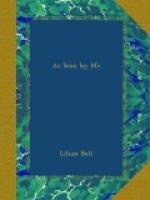who knows it. Have I not been with you everywhere,
and have I, with my two eyes, which certainly are
as good as yours—have I seen these things
you describe?” It was pathetic, for the muse
of the poet soon felt the mire in which it daily trod.
The fire faded from the girl’s eye, her radiance
disappeared, her noble enthusiasms paled, her fantastic
and brilliant imagination dulled, and soon she sat
listlessly in our midst, a tired, patient smile upon
her delicate face, while her sister discoursed volubly
upon clothes. Alas, the old fable of the iron
pot and the porcelain kettle drifting down the stream
together! At the end of the journey the iron
pot had not even a scratch upon its thick sides, but
the porcelain was broken to pieces. How I longed
to take that wounded imagination, that whimsical wit,
under my wing and explore Rome with her! But
circumstances held the two together, and I took instead
my guide, Seraphino Malespina. Seraphino deserves
a chapter by himself. His observations upon human
nature were of much more value to me than his knowledge
of Rome, accurate and worthy as that was. He
was the best guide I ever had. I had heard of
him, so when we arrived I simply wrote to him and
engaged him by the week. He took us everywhere,
never wasted our money (which is a wonder in a guide),
and, while I may forget some of his dates and statistics,
I shall never forget his shrewdness in understanding
human nature. His disquisitions on the ordinary
tourist, and his acute analysis of the two sisters
I have described, were so accurate that I determined
then and there that Seraphino was a philosopher.
The interest I took in his narratives pleased him
to such an extent that he was unwearied in searching
out interesting material. I taught him to use
the camera, and he photographed us in the Colosseum
and in front of the Arch of Constantine.
He persuaded me to coax the poet away from her sister
one day and to take her with me instead of my companion.
I did so, and to this day I thank my guide for his
wisdom, for once out from under the sister’s
depressing influence, that whimsical genius, worthy
of being classed with the most famous of wits, blossomed
under my appreciative laughter like a rose in the
sunlight.
We saw, too, the magnificent statue of Garibaldi—a
superb thing, which overlooks the whole city of Rome.
We tossed pennies into the fountain of the Trevi,
and drank some of the water, which is a sure sign,
if you wish it at the time you drink, that you will
return to Rome.
It was on the day that we went to Tivoli that I heard
the first war news from America which I regarded final.
We were on the Nile when the Maine was blown
up, and all through Egypt and Greece news was slow
to travel. When we got to Italy we were dependent
upon London for despatches. I waited until I
received my own papers before I knew the truth.
Finally, on our departure for Tivoli, my American mail
was handed to me, and I found what preparations were
being made—that my brother was going!
I remember Tivoli as in a haze of war-clouds.
America arming herself for war once more! Some
of my family—my very own—preparing
to go! How much do you think I cared for the Emperor
Hadrian and his villa, which was a whole town in itself,
and his waterfalls and his wonderful objects of art?




